
![[Home Icon]](images/bhome.gif)
![[What's New Icon]](images/bnews.gif)
![[Products Icon]](images/bprdsrv.gif)
![[TOC Icon]](images/btoc.gif)
Performing reticulocyte analysis is easier and faster
than ever!
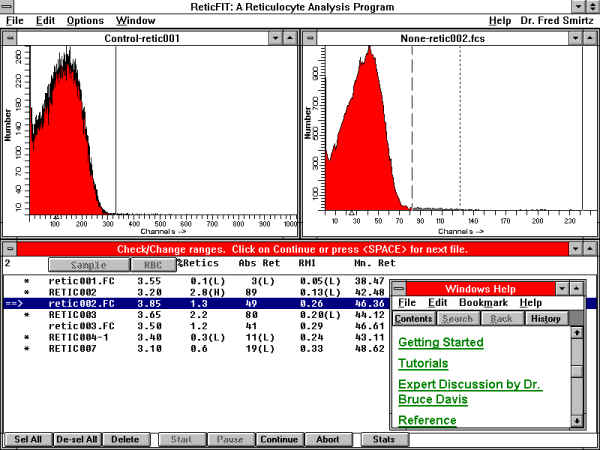
Image caption goes here.
When you are ready to get down to the
business of reticulocyte analysis, you're ready for ReticFit.
From the ground up, we have designed this program to be the
quickest, most automatic retic software you will ever use. We
started by talking to the experts in the field. Then we sat down
and watched the way they worked. That was enough to get us
started. We had only just begun, though. Our test crew in the
field tested and retested. With each test cycle, we worked the
suggestions of expert and novice users into the program to make
it work the way they, the users, wanted it to work. ReticFit is
the result. With ReticFit, you simply select control and test
files with your mouse, click on the Start button, and away you
go! With built-in pause control, you can adjust your range
cursors as you go, but ReticFit positions them automatically,
too. Statistics for percent retics, absolute retics, mean retics,
and RMI are performed in the blink of an eye. And there is even
an expert discussion in our on-line help system.

ReticFit
Printing options for text-only, or mixed text and graphics
reports.
Control histogram is automatically scaled.
Range cursors are automatically placed by programmable area
percentage.
Edit sample id and red blood count quickly and efficiently.
Easy access push buttons make tasks quick and easy.
On-line help and tutorials with expert discussion.
Color-coded graphics indicate RMI area.
Results are flagged when outside user-defined ranges.
View all control-test pairs in the job easily.
Obtain statistics on all analyzed items.
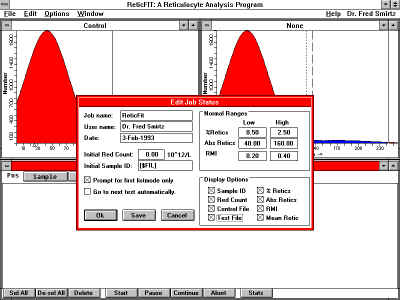
1. Edit information related to the job.
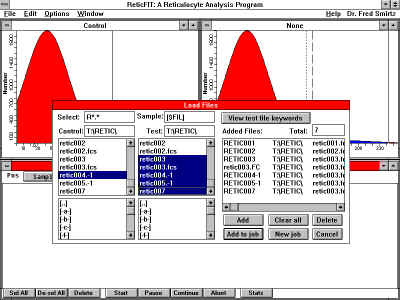
2. Match up control and test files to create a batch.
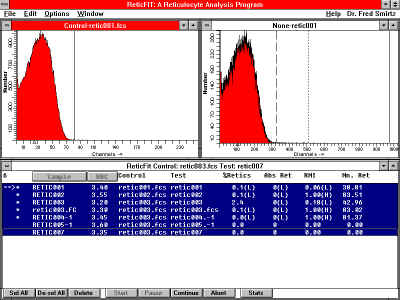
3. Confirm ReticFit's automatic cursor placement.
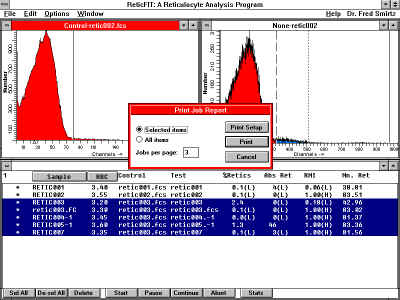
4. Review, print, and save your analysis results.
Features
-
Point and click to match
controls with tests.
-
Create test batches of
virtually any size.
-
Edit red blood count and
sample id quickly and efficiently.
-
Identify each job by
name, date and operator.
-
Start, pause, abort, and
continue analysis with single mouse click.
-
Read all analysis results
as they are performed.
-
Identify normal ranges
for your data.
-
Flag results outside of
normal ranges, high and low.
-
Setup automatic cursor
positioning based on your data.
-
Enter positioning
information as percentages of the x scale for
consistency between files and labs.
-
Define upper channel
boundary for test files to eliminate unwanted
data.
-
Adjust control and test
cursors on the fly.
-
Set range for automatic
control cursor positioning, with alerts for
movement outside of range.
-
Calculate percent retics,
absolute retics, mean retics, and RMI with
lightning speed.
-
Select which statistics
are displayed on the screen.
-
Choose the fonts and
colors you want to display.
|
-
Print multiple page
graphical reports.
-
Print statistical report
for entire job.
-
Work with your FCS
listmode and histogram formats.
-
Gate your FCS listmode
files.
-
Save results in delimited
database for MIS integration.
-
Keep cumulative
statistics for analyses over time.
-
Save histograms as
pictures.
-
Extract FCS keywords for
test file identification.
-
Install and setup the
program in minutes.
-
Work entirely in the
Microsoft WindowsTM environment.
-
Multi-task with other
applications.
-
Use your MS-DOS PC for
off-line analysis.
-
Refer to the fully
illustrated operations manual.
-
Find help quickly with
On-line help - just a click away.
-
Print to any of the
hundreds of printers, slide makers, and film
recorders supported by Windows.
-
Copy to the Windows
Clipboard in popular bitmap, metafile, and text
formats.
-
Connect with other
Windows applications via DDE.
|
![[Home Icon]](images/bhome.gif)
![[What's New Icon]](images/bnews.gif)
![[Products Icon]](images/bprdsrv.gif)
![[TOC Icon]](images/btoc.gif)
![[HRule Image]](images/div.gif)
Send mail to verity@vsh.com with questions or comments about
this web site.
Copyright © 1996 Verity Software House, Inc.
Last modified: September 29, 1996
CD ROM Vol 2 was produced by staff at the Purdue University Cytometry Laboratories
and distributed free of charge as an educational service to the cytometry community.
If you have any comments please direct them to Dr. J. Paul Robinson, Professor & Director, PUCL,
Purdue University, West Lafayette, IN 47907. Phone:(317) 494-0757; FAX (317) 494-0517; Web http://www.cyto.purdue.edu
EMAIL robinson@flowcyt.cyto.purdue.edu








![]()



